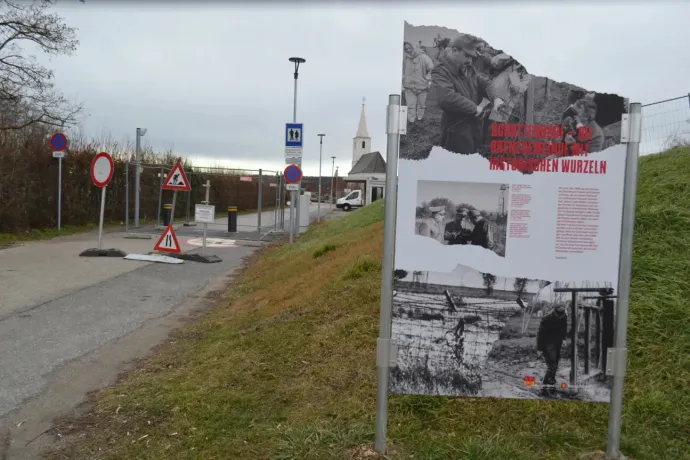Burgenland court rules that barrier on Austrian-Hungarian border, forcing Hungarian commuters to detour not lawful

The case of the border crossing between Ágfalva in western Hungary and Schattendorf (Somfalva) in Austria's Burgenland region, which has been closed for almost two years, as well as the pedestrian zone that was created to justify the closure, has taken a new turn. An international law firm has filed an administrative lawsuit against the local council in the Austrian village. The Burgenland court has agreed with the constitutional criticism expressed in their complaint and is now asking the Austrian Constitutional Court to annul the Schattendorf decree that initiated the closure.
The Austrian town of Schattendorf closed the border to car traffic in 2023, forcing Hungarians commuting to the neighbouring country for work to take a 30-kilometre detour. The international law firm NZP Nagy Legal then filed an administrative lawsuit against the municipality of Schattendorf (Somfalva) in Burgenland, claiming that the closure of the small border crossing between the Austrian village and the Hungarian village of Ágfalva violated EU law.
The Administrative Court of Burgenland, which handled the case, agreed with the constitutional criticisms raised in the law firm's claim and therefore referred the case to the Austrian Constitutional Court, asking it to annul the entire decree about establishing the pedestrian zone, which was introduced as the reason for closing the border crossing.
Did the municipality have the competence for adopting such a regulation?
The court listed several problems with the ordinance of the Schattendorf municipality – Máté Ruzicska, who is working on the case at the law firm with a colleague, told Telex. There was no public consultation on the design of the pedestrian zone and the consequent closure of the border, but more importantly
'the regulation is contrary to the principle of the rule of law and the municipality had no competence to adopt it'.
Moreover, the local regulation was not adopted for the purpose of 'road safety' as defined by law, but for the purpose of 'eliminating commuter traffic'.
"Even if the municipality had had the competence to introduce such a measure, it would have been required to consider the conflicting public interests. However, this was not done in any form," Ruzicska said, explaining the court's reasoning.
As he pointed out, the reply to the public interest data request submitted by the Hungarian lawyers also revealed that the expert commissioned by the Austrian municipality was a personal acquaintance of the mayor, and he was not a traffic engineering expert but an architectural expert. The expert opinion itself is inconsistent and unsubstantiated.
The Burgenland Administrative Court has now also ruled that the decree infringes upon the constitutional principle of equality before the law.
"There were many who smirked at us when we filed the lawsuits, and according to what appeared in the Austrian press, they considered our mission impossible. But we believe that what happened at Schattendorf is a clear violation of EU and constitutional laws. This has now been confirmed by a court," commented the lawyer.
The Austrian Constitutional Court will now request a written opinion from the parties before deciding whether to annul the municipality's decree.
Commuters forced to a detour
In early 2023, the municipality of Schattendorf, located near the border with Hungary, decided to create a pedestrian zone next to the local cemetery. Everyone knew what was behind this: a promise made by the newly elected mayor. Every day at dawn and in the afternoons, a large number of Hungarian commuters had been driving through one of the village's streets. The pedestrian zone was seen by many – and this was confirmed by subsequent measures – as a pretext for the Burgenland municipality to close the small border crossing between Ágfalva and Schattendorf. Construction work began on 1 March 2023, stopping all vehicle traffic, and in the summer, electric posts embedded in the ground and acting as a barrier were installed.
Although a few people were granted permission to cross on exceptional grounds and upon paying a fee of €160, the vast majority of requests were rejected by the Schattendorf authorities. It didn't matter if someone was working nearby, had relatives, or even a sibling on the other side. And despite the protests and picnics, the closure remained, forcing commuters from Sopron and Ágfalva to a 30-kilometre detour every day.
The lawyers of the international law firm NZP Nagy Legal first read about the modern iron curtain on Telex and found the border closure unacceptable. They challenged the decision which violates EU law, from multiple sides and on various forums, and even filed a claim for damages against the Republic of Austria for what they consider to be the unlawful extension of border control.
For more quick, accurate and impartial news from and about Hungary, subscribe to the Telex English newsletter!